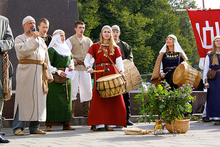
Modern pagan music or neopagan music is music created for or influenced by modern Paganism. Music produced in the interwar period include efforts from the Latvian Dievturība movement and the Norwegian composer Geirr Tveitt. The counterculture of the 1960s established British folk revival and world music as influences for American neopagan music. Second-wave feminism created women's music which includes influences from feminist versions of neopaganism. The United States also produced Moondog, a Norse neopagan street musician and composer. The postwar neopagan organisations Ásatrúarfélagið in Iceland and Romuva in Lithuania have been led by musicians.
Several subgenres of rock music have been combined with neopaganism. Neofolk bands have featured pagan revivalists since the genre's inception, pagan rock emerged in the 1980s as a distinct genre or subgenre of gothic rock, and several heavy metal bands have associated themselves with paganism since the early 1990s. Festivals like Wave-Gotik-Treffen and Castlefest have become venues for eclectic neopagan popular music, which may contain elements of gothic rock, neo-Medieval music, folk music, electronic music, ambient music and underground music.
